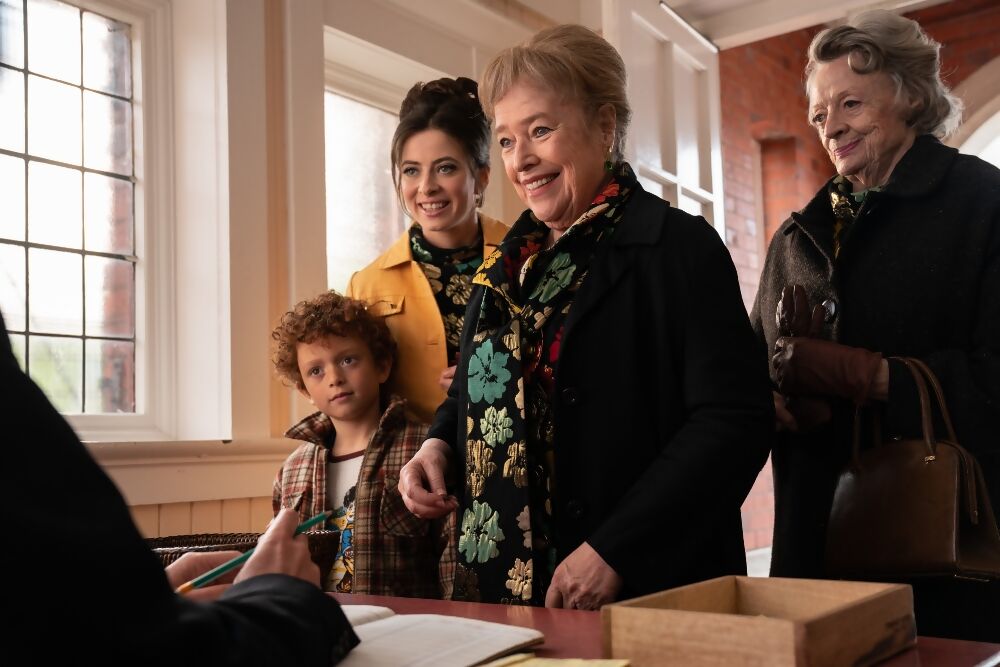
Director Thaddeus O’Sullivan’s The Miracle Club takes us back to Ireland in 1967, where every woman in the Dublin-based community of Ballygar seems to be searching for a miracle. The need spans generations, with the elderly Lily (Maggie Smith), the middle aged Eileen (Kathy Bates), and young mother Dolly (Agnes O’Casey) all wanting to make the pilgrimage to the sacred French town of Lourdes, each for their own personal reasons. The opportunity arises through the annual church talent show, where the winning group will receive tickets to go on the journey, accompanied by Father Dermot Byrne (Mark O’Halloran). The return of old friend Chrissie (Laura Linney) after a 40-year absence throws a spanner in the works, as she returns from America following the death of her mother, and subsequently takes her place on the pilgrimage. The awkwardness speaks to a dark history between her, Eileen and Lily, and Linney gets to be brilliantly sharp-edged. There’s an underlying vulnerability to her character as well, though, and that emerges more during their stay in Lourdes as secrets are revealed. Their departure from Ballygar is very much a feel-good part of the film, not least because it’s an act of defiance of the part of these women. Eileen and Dolly both have husbands who mock their faith and insist on them staying to run the household, and their leaving is a step towards freedom from the restrictiveness of their lives. There are some very amusing scenes throughout The Miracle Club where we return to Ballygar to witness Stephen Rea’s Frank fail utterly at cooking a decent dinner, and Mark McKenna’s George trying, and failing, to figure out how to do up a nappy. Their learning curve provides some lightheartedness to what can be quite a serious film, and highlights that sometimes miracles come in unexpected forms.
 Back in Lourdes, the progression of the women’s journey is largely very formulaic, but there is a good examination of the concept of faith during the film. Eileen, Lily and Dolly very much go to Lourdes expecting tangible, physical miracles to occur, and this understandably leads to them having to reevaluate their faith and their definition of what a ‘miracle’ really is. Agnes O’Casey gives a really raw performance as Dolly, and Kathy Bates is very good in a role that’s much more sombre than what we’re used to seeing from her.
Bates’ performance escalates throughout the film as emotions heighten, and there’s a good sense of building tension. When the bubble finally bursts, though, the things the women reveal to each other aren’t exactly revelatory. There’s no flaw in the way the scene is acted, but the film tends to stick to clichés. The narrative arc is easily guessable and it doesn’t ever do anything unexpected.
The Miracle Club is held up by solid performances from the central actors. It has its amusing moments, but this tale about faith and friendship is ultimately predictable and formulaic.
Back in Lourdes, the progression of the women’s journey is largely very formulaic, but there is a good examination of the concept of faith during the film. Eileen, Lily and Dolly very much go to Lourdes expecting tangible, physical miracles to occur, and this understandably leads to them having to reevaluate their faith and their definition of what a ‘miracle’ really is. Agnes O’Casey gives a really raw performance as Dolly, and Kathy Bates is very good in a role that’s much more sombre than what we’re used to seeing from her.
Bates’ performance escalates throughout the film as emotions heighten, and there’s a good sense of building tension. When the bubble finally bursts, though, the things the women reveal to each other aren’t exactly revelatory. There’s no flaw in the way the scene is acted, but the film tends to stick to clichés. The narrative arc is easily guessable and it doesn’t ever do anything unexpected.
The Miracle Club is held up by solid performances from the central actors. It has its amusing moments, but this tale about faith and friendship is ultimately predictable and formulaic.
The Miracle Club is in cinemas on 13th October. — Thank you for visiting! If you’d like to support our attempts to make a non-clickbaity movie website: Follow Film Stories on Twitter here, and on Facebook here. Buy our Film Stories and Film Junior print magazines here. Become a Patron here.






